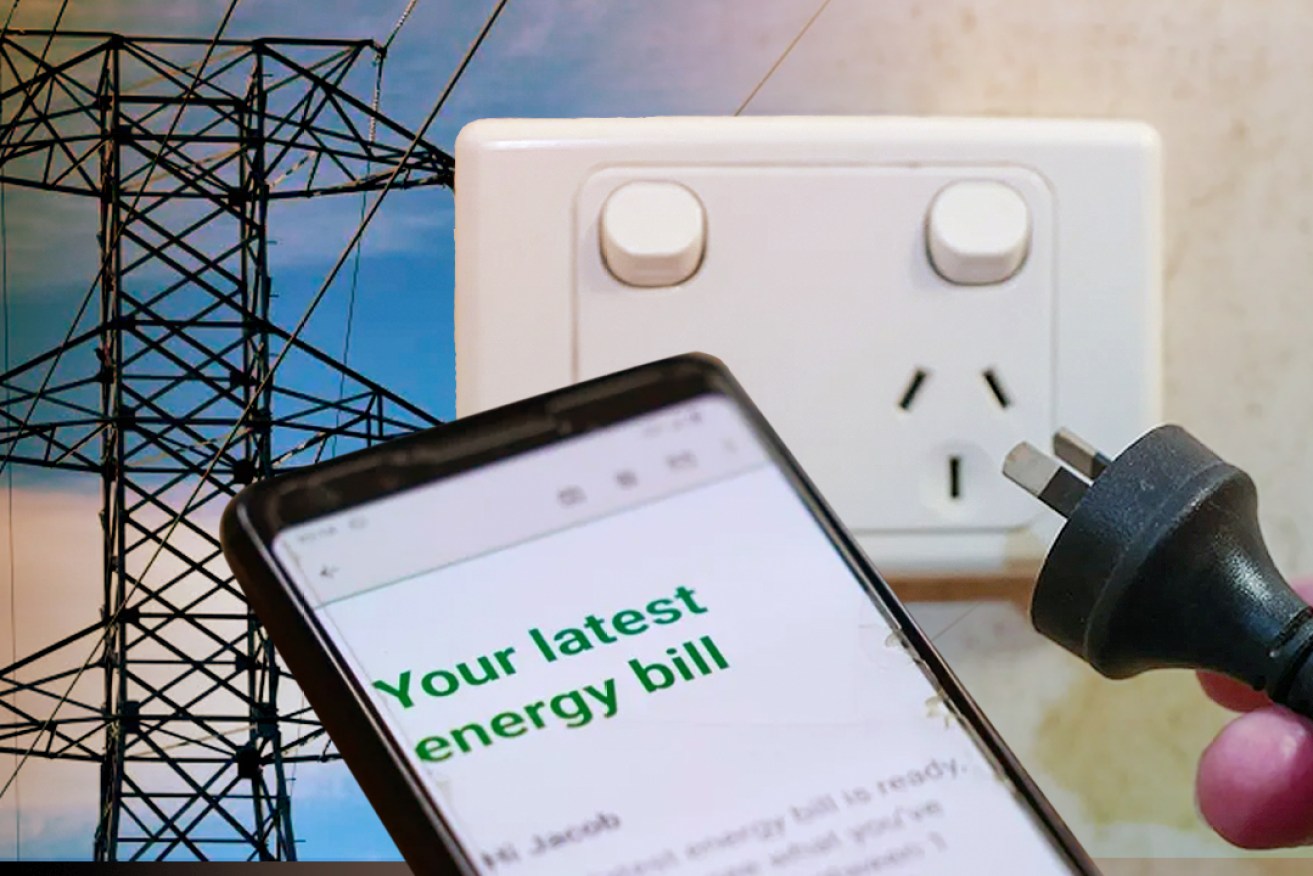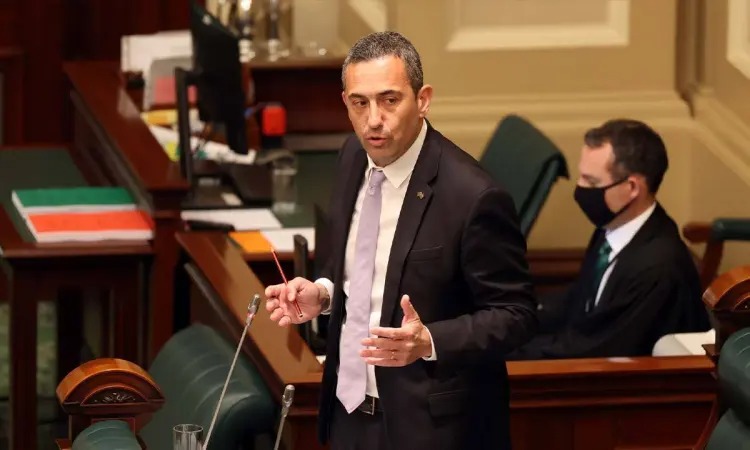‘Kick in the guts’: Power bill hike to hit SA homes, businesses
Electricity bills for thousands of South Australian households and small businesses will jump by between 22 and 29 per cent from July 1, prompting warnings about increasingly stretched budgets and companies forced to pass higher costs onto customers.


Image: Tom Aldahn/InDaily
The Australian Energy Regulator (AER) today released its final default market offer (DMO) for the 2023/24 financial year, with year-on-year electricity prices to increase between $439 and $512 for some South Australian households and $1310 for some small businesses.
It represents a price hike between 22.5 and 23.9 per cent for households and 28.9 per cent for businesses.
The AER’s final determination is higher than the draft DMO it released in March which foreshadowed increases between $401 to $485 for residents and $1151 for small businesses.

The Australian Energy Regulator breakdown of price hikes across SA, NSW, SE Queensland. Image: AER
The DMO is a regulated price cap that sets the maximum price energy retailers can charge customers who have not shopped around for a better deal.
The majority of customers are on lower, discounted market contracts, but these are also set to rise due to today’s decision, Energy Minister Tom Koutsantonis warned.
In South Australia, there are around 62,000 residential customers (7.8 per cent of SA’s consumer market) on the DMO who will be directly impacted by the price hike, along with around 13,000 small businesses (15.9 per cent).
South Australian DMO households using 4212 kWh of electricity a year plus 1200 kWh of controlled load (separately metered tariffs used for appliances such as electric hot water storage systems) will face a 22.5 per cent increase in their power bills, rising $512 to $2787 a year.
South Australian DMO households without controlled load and using 4011 kWh a year will face a 23.9 per cent increase, rising $439 to $2279.
Small businesses without controlled load will pay $5849 if they use 10,000 kWh annually, representing a $1310 – or 28.9 per cent – year-on-year increase.
Koutsantonis said any South Australian households or businesses on a DMO should shop around for a better deal.
“If you don’t know what offer you’re on, ring up your retailer and… ask them, ‘Am I on the default market offer?’ And if the answer is yes, you should immediately move off it,” he told ABC Radio Adelaide.
“And then you should ask (the retailer) a question about what is your retail or market offer… so you can work out exactly how much you can save.”
Households that switch from the DMO to a market offer could save between 7 to 17 per cent on their power bills, according to AER data, while small businesses could save between 9 and 26 per cent.
The DMO acts as a reference point for consumers as electricity companies must compare their market offer to the DMO when advertising their energy deals.
Koutsantonis said retail offers would also rise due to the AER’s decision – but it is unclear how much.
“We won’t know for about three months how the retail offers, the market offers respond to this,” he said.
“So, that’s why it’s important people… shop around.

Energy Minister Tom Koutsantonis. Photo: Tony Lewis/InDaily
“The truth is the default market offer is meant to be an emergency tariff.
“You move house, you just need the power on, you ring up AGL or Origin and say, ‘just turn my power on’, that puts you on a default market offer until you work out exactly what your load is going to be and what you want in your house.
“I would advise no one to be on a default market offer.”
Koutsantonis also said the proportion of South Australian households on the DMO had decreased from “nearly 50 per cent” in 2011 to around 7 per cent today.
The AER’s decision to set a 28.9 per cent increase for South Australian small businesses is higher than the price hikes it set for New South Wales businesses (between 14.7 and 21.6 per cent) and southeast Queensland (21.9 per cent).
Business SA’s general manager of policy and advocacy Kendall Crowe said the decision would force some small businesses to pass on costs to their customers.
“For a really long time coming out of COVID… they (businesses) were still reticent to pass on costs through their pricing,” she said.
“We’re seeing more and more are now doing that, but I think there are still some who just don’t want to head down that path, but… now I think they would have absolutely no choice but to do this.
“They understand that increasing prices doesn’t help the inflation issue, but they need to be able get some money in the door to be able to pay for things like electricity and wages and transport costs and all the other things.”
She said businesses in the manufacturing sector would be among those most impacted.
“The ones that are drawing on a lot on electricity and have no choice but to do that because they’re in manufacturing… they’re obviously going to be hit,” Crowe said.
“That’s an enormous price rise to deal with on the back of inflation.
“It’s everything’s just spiralling up up up and this is a kick in the guts to be honest.”
Announcing its decision this morning, the AER said wholesale energy costs continue to be “the predominant driver of increased retail electricity prices”.
The regulator said the decision to lift the DMO higher than its draft determination factored in the latest inflation forecasts and “updated wholesale, network, environmental schemes and retail costs”.
“We know households and small businesses continue to face cost-of-living pressures on many fronts, and that’s why it’s important the DMO provides a safety net for those who might not have shopped around for a better power deal,” AER chair Clare Savage said.
“In setting the DMO price this year we have sought to protect consumers from unjustifiably high prices and at the same time allow retailers to offer consumers better deals than their standard plans.”
The DMO hike comes after the state and federal government announced earlier this month they would jointly-fund a $254 million Energy Bill Relief Fund touted as “the most significant cost of living package in the state’s history”.
The measure will see 420,000 South Australian households receive a one-off energy bill rebate of $500 and 86,000 small businesses receive a rebate of $650.
The money will be taken off people’s power bills, not paid directly into their bank accounts.
Those eligible include small businesses, as well as concession-card holders, people receiving family and carers payments and those receiving electricity concessions under a current state government scheme.
It is in addition to an existing state government energy concession worth up to $263.15 in 2023-24.
But South Australian Council of Social Service CEO Ross Womersley said concessions can “only go so far”.
He called on the state government to examine lifting minimum energy efficiency standards for households and funding retrofits for residents who can’t afford upgrades.
“The increase in the DMO may be somewhat offset by the one-off $500 bill relief for eligible customers – but there are many who need help who will miss out,” he said.
“Ultimately concessions and one-off relief packages can only go so far. They don’t address some of the root causes for why South Australians are seeing their bills climb beyond what they can afford.
“An urgent, mass rollout of energy efficiency upgrades for our households is essential to minimise power price pain during this cost of living crisis, and future-proof our homes.”
The state Opposition today labelled the price increases “completely unacceptable”.
“South Australians cannot afford to continue fighting skyrocketing costs alone and that’s why, once again, we are calling on Peter Malinauskas to prioritise broad cost of living relief in next month’s State Budget,” Opposition energy spokesperson Stephen Patterson said.
The state government in January formally asked the private sector to provide it with ideas and advice on how to protect South Australian households from power price increases.
It has also asked the Essential Services Commission of SA to conduct an inquiry into energy companies potentially reaping unjustified profits from the national energy situation.
ESOCSA is due to submit a draft report this month.




